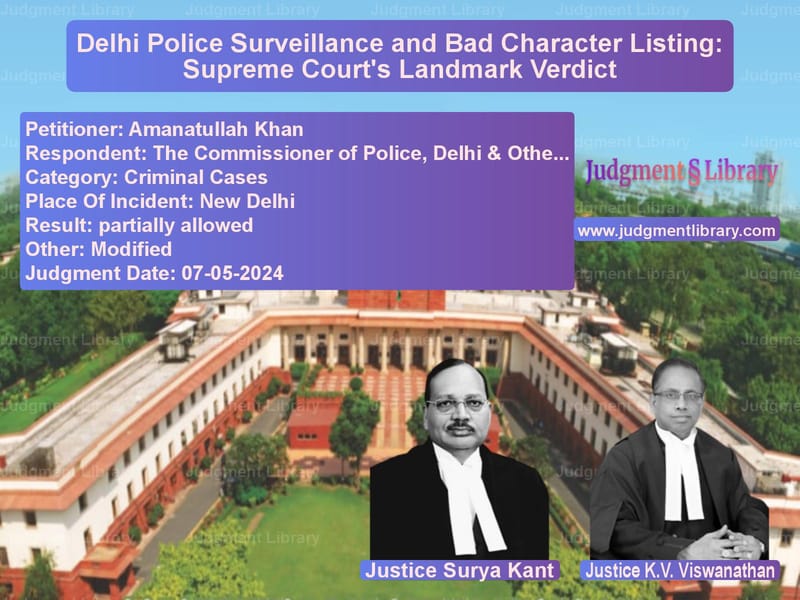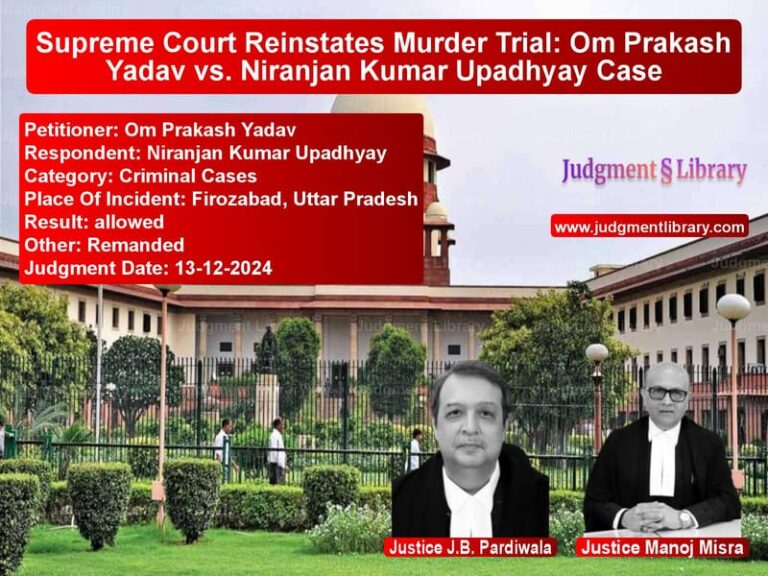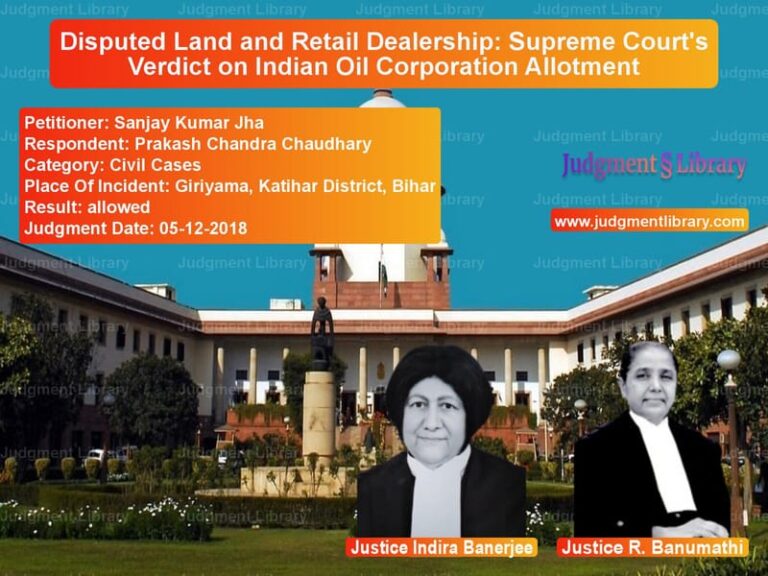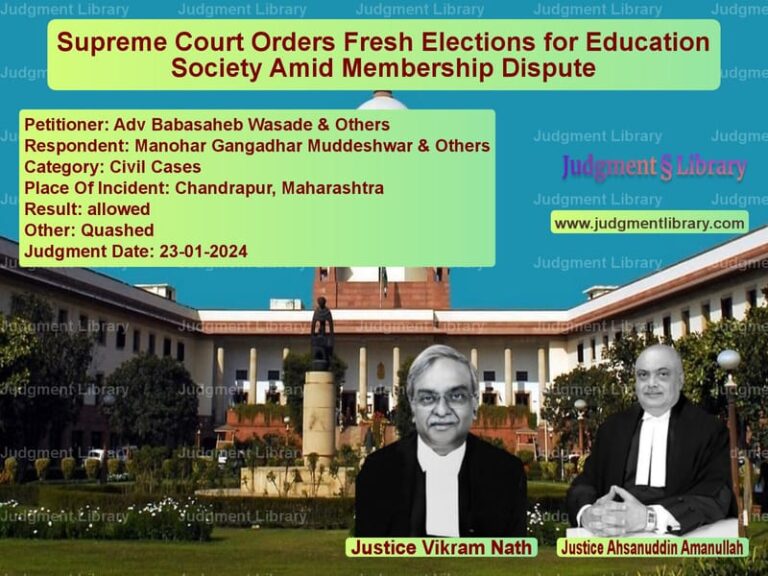Delhi Police Surveillance and Bad Character Listing: Supreme Court’s Landmark Verdict
The case of Amanatullah Khan vs. The Commissioner of Police, Delhi & Others revolved around the issue of police surveillance and the designation of individuals as ‘Bad Characters’ under the Punjab Police Rules, 1934. The Supreme Court was called upon to determine whether the police had followed due process in opening a History Sheet against the appellant and whether the amended Delhi Police Standing Order adequately protected the rights of individuals subjected to such surveillance.
The matter raised significant concerns regarding fundamental rights, individual privacy, and the potential misuse of colonial-era surveillance laws. This judgment is a landmark ruling that clarifies how law enforcement agencies must ensure that their surveillance mechanisms do not violate constitutional protections.
Background of the Case
The case originated when the Delhi Police opened a History Sheet against the appellant, Amanatullah Khan, and sought to declare him a ‘Bad Character.’ His name was entered into ‘Surveillance Register-X, Part II, Bundle A’ at Jamia Nagar Police Station in South-East Delhi. The appellant challenged this action before the Delhi High Court under Article 226 of the Constitution and Section 482 of the CrPC, seeking the quashing of the History Sheet.
The Delhi High Court dismissed his petition on January 19, 2023, upholding the police action. The appellant then approached the Supreme Court, arguing that his fundamental rights had been violated.
Legal Issues Raised
- Whether the Delhi Police followed the due process of law while opening a History Sheet against the appellant.
- Whether the inclusion of the appellant’s minor children in the History Sheet violated their right to privacy.
- Whether the Punjab Police Rules, 1934, as applied in the NCT of Delhi, needed reform to align with modern constitutional values.
- Whether the amended Standing Order of the Delhi Police provided sufficient safeguards against arbitrary surveillance.
Petitioner’s Arguments
The appellant’s counsel contended:
- The police had arbitrarily included his name in the surveillance list without concrete evidence.
- His minor children’s names were also included in the History Sheet, which was illegal and violated their right to privacy.
- The police acted under outdated and colonial-era Punjab Police Rules, 1934, which required reform.
- The High Court had failed to protect his constitutional rights under Article 21.
The petitioner further argued that maintaining a History Sheet against him was unnecessary and disproportionately affected his rights. He emphasized that law enforcement agencies must justify their actions with substantial evidence rather than act on suspicions or prejudices.
Respondents’ Arguments
The Delhi Police, represented by senior counsel, defended their actions, stating:
- The inclusion of names in the History Sheet was based on intelligence reports and past criminal records.
- The surveillance was internal and did not impact the appellant’s day-to-day life.
- The police had already taken steps to amend their Standing Order to ensure that only relevant individuals were included in surveillance lists.
The police also justified the surveillance under the pretext of maintaining law and order, claiming that individuals listed in the History Sheet were typically habitual offenders. However, they acknowledged that certain modifications were necessary to avoid unnecessary harassment of individuals who had no criminal involvement.
Supreme Court’s Ruling
The Supreme Court, after hearing both sides, ruled:
- The inclusion of the appellant’s minor children in the History Sheet was a violation of their right to privacy.
- The Delhi Police had issued an amended Standing Order (dated March 21, 2024) to rectify past errors.
- Surveillance rules should be strictly regulated, and mechanical entries in History Sheets should be prevented.
- The police must conduct periodic reviews of History Sheets to ensure that innocent individuals are not wrongfully listed.
- Other states and union territories should consider adopting similar safeguards to protect citizens from wrongful surveillance.
The Court held that while surveillance mechanisms serve a legitimate purpose in preventing crime, they must be used judiciously and within the confines of constitutional principles. It stated that wrongful inclusion in a surveillance register could lead to long-term reputational damage and social stigma.
Implications of the Judgment
- The ruling emphasized the importance of maintaining a balance between state security and individual rights.
- It reinforced the need for regular audits and oversight of law enforcement surveillance practices.
- It set a precedent for other states to review their outdated police surveillance rules.
- It established that the privacy of individuals, especially minors, must be upheld in all circumstances.
The judgment also directed the Delhi Police Commissioner to appoint a senior officer to review History Sheets periodically and remove individuals who no longer met the criteria for surveillance.
Conclusion
The Supreme Court’s decision underscores the importance of protecting citizens from arbitrary police surveillance. While law enforcement agencies have the right to maintain surveillance on individuals with criminal records, they must do so transparently and within constitutional limits.
By directing a revision of existing surveillance rules and calling upon other states to evaluate their policies, the ruling represents a step forward in ensuring that surveillance practices are aligned with modern democratic principles.
Petitioner Name: Amanatullah Khan.Respondent Name: The Commissioner of Police, Delhi & Others.Judgment By: Justice Surya Kant, Justice K.V. Viswanathan.Place Of Incident: New Delhi.Judgment Date: 07-05-2024.
Don’t miss out on the full details! Download the complete judgment in PDF format below and gain valuable insights instantly!
Download Judgment: amanatullah-khan-vs-the-commissioner-of-supreme-court-of-india-judgment-dated-07-05-2024.pdf
Directly Download Judgment: Directly download this Judgment
See all petitions in Fundamental Rights
See all petitions in Public Interest Litigation
See all petitions in Judgment by Surya Kant
See all petitions in Judgment by K.V. Viswanathan
See all petitions in partially allowed
See all petitions in Modified
See all petitions in supreme court of India judgments May 2024
See all petitions in 2024 judgments
See all posts in Criminal Cases Category
See all allowed petitions in Criminal Cases Category
See all Dismissed petitions in Criminal Cases Category
See all partially allowed petitions in Criminal Cases Category







